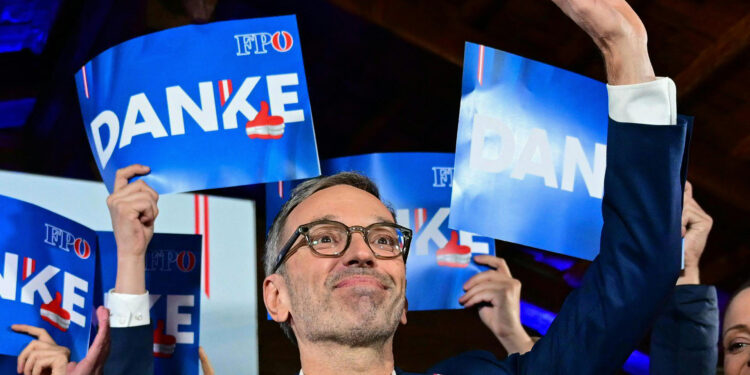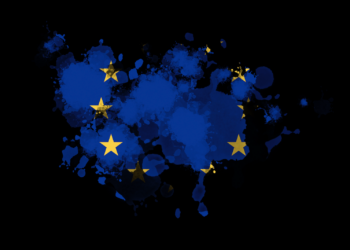Brussels – For the first time since the end of World War II, the far right has come out on top in federal elections in Austria. The Freedom Party, led by Herbert Kickl (Fpö), won more than 29 percent of the vote, ahead of the People’s Party (Övp), which leads the outgoing executive, by about three points. Now begins the complex arithmetic of coalitions to give the country a government.
As widely expected, Vienna went decisively to the right in elections for the Nationalrat, the lower house of the Austrian legislature, held Sunday (Sept. 29). Exit polls speak of a resounding success for Kickl’s post-Nazi, anti-immigration, and pro-Russia formation, the Freiheitliche Partei Österreichs (Fpö) founded in the mid-1950s by former members of the German SS: data available at the moment give it 29.2 percent of the vote and 58 seats in the lower house, or just under a third of the total of 183 (and 26 more than in the outgoing legislature).
Last June, the Fpö had also come first in European elections, bringing the largest contingent of the Austrian delegation to Strasbourg as a dowry: 6 MEPs who sit on the benches of the Patriots for Europe (PfE), one of the groups into which the radical right is divided in the European Parliament and which also includes Matteo Salvini’s League, Marine Le Pen and Jordan Bardella’s Rassemblement National, Viktor Orbán’s Fidesz, and Geert Wilders’ PVV.
A success that comes from afar
The Austrian ultra-right’s victory is not out of the blue but comes from afar: since former leader Jörg Haider gave the party a sharp turn to the right, the Fpö has been in the country’s government twice, in 2000 and 2017, always in coalition with the Övp. In the 1999 elections, it won 26.9 percent, which, until yesterday, had been its all-time high in support, while seven years ago, it had fallen to 16.2 percent. After the so-called Ibiza gate, the scandal that led to the collapse of the executive led by Chancellor Sebastian Kurz and early elections in 2019, Kickl (who was Interior Minister at the time) was able to intercept widespread discontent in the population, arguing especially on issues such as the exploding cost of living, the consequences of the war in Ukraine (remember that more than 80 percent of the gas imported from abroad by Vienna comes from Russia), the Covid-19 pandemic, and immigration.
The Fpö’s electoral program is called “Fortress Austria” and calls for the introduction of remigration schemes (similar to Germany’s AfD) for “uninvited foreigners” to create a more “homogeneous” nation, in addition, of course, to much stricter border controls and a crackdown on asylum laws. Kickl and his people also call for an end to sanctions against Moscow, the suspension of military aid to Kyiv, and the return of more powers from Brussels to national chancelleries.
Speaking hot on the heels of the first exit polls, the Fpö leader declared that “we are ready to lead a government. We are ready to bring about this change in Austria side by side with the people.” Kickl referred to himself as the Volkskanzler, an expression – which means “the people’s chancellor”- used by Adolf Hitler, highlighting that the link with the party’s post-Nazi origins hat was never really severed. Furthermore, SS choruses were sung last Friday at the funeral of a longtime Fpö politician in Vienna.
However, calling Fpö colleagues “Nazis” does not sit well with, for example, the League’s General Staff, whose head of the MEP delegation, Paolo Borchia, calls “the post-vote assessment from parties that have been misruling Europe for years curious but moody.” “When the ballot box soundly rejects establishment forces, they start seeing fascists and Nazis everywhere,” he added, lamenting “a strange concept of democracy.” Borchia then branded it “politically unacceptable, a few hours after the commemoration of the Marzabotto massacre, to talk about fascism and Nazism, instrumentally using horrors that belong to the past to attack opponents.”
The puzzle of alliances
The People’s Party (Österreichische Volkspartei, Övp) of the current chancellor, Karl Nehammer, belongs, however, is the big loser of election night. It stopped at 26.5 percent, 11 points lower than in the last election in 2019 (and 19 fewer elected from 71 to 52). The Social Democrats of the Spö (Sozialdemokratische Partei Österreichs) remained the third-largest force in the hemicycle, gaining one seat (coming in at 41) but with their worst-ever result in the polls with just 21 percent. The Neos Liberals (Das Neue Österreich und Liberales Forum) rose from 8.1 percent to 9 percent, gaining two seats (from 15 to 17). The Greens (Die Grünen) – who were in government with the Övp – plummeted from 13.9 percent to 8 percent, losing 11 elected members (from 26 to 15). The delicate game that must lead to the formation of the new executive opens at this point.
As has been the case since 1987, the new government will revolve around the Övp. One option for the conservatives is a coalition with the far right but keeping the chancellery for themselves. Putting the Övp and Fpö seats together brings the total to 110 seats, comfortably above the absolute majority threshold set at 92, and on some dossiers, the two parties are not too far apart, starting with migration. But Nehammer, who succeeded Kurz at the head of the Övp, has refused to participate in a government with Kickl as chancellor. At this point, as a compromise to enter the majority, the Fpö might decide not to express the head of government while still placing its own in the key ministries of the next cabinet.
Another option for the Övp could be to seek a broader alliance to exclude the far right. But in this case, we would be talking about a three-way coalition (Populars, Social Democrats plus a third leg, likely the Neos Liberals), which would be extremely unstable and could lead to a paralysis of government action, as exemplified by the endless difficulties of the “traffic light coalition” led by Olaf Scholz in Berlin. After all, it is unlikely that the president of the Republic, the ecologist Alexander Van der Bellen, will appoint the ultra-right leader as federal chancellor before he has tried any other course. The days or weeks ahead will comprise frantic political negotiations among parliamentary forces in Vienna to find a balance and provide the country with a government as soon as possible.
Should the right-wing alliance take off, Austria would join a bloc of EU member states led by the Euroskeptics and close to the Kremlin, which could create quite a few headaches in Brussels. The other club members are Viktor Orbán’s Hungary and Robert Fico’s Slovakia. Next year, the Czech Republic could also join if Andrej Babiš returns to power in the upcoming elections.
English version by the Translation Service of Withub







